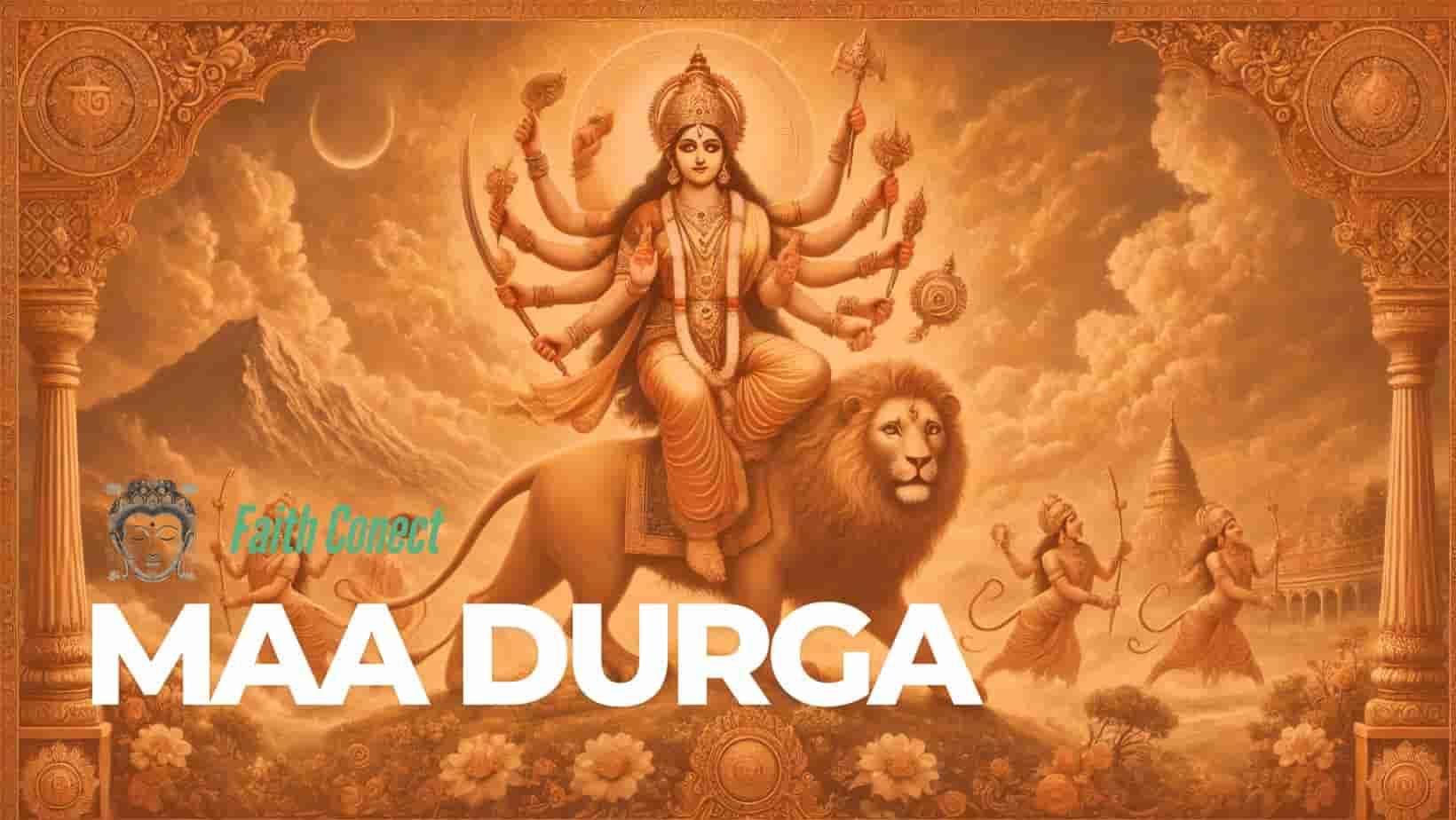Maa Durga: Divine Feminine Power, Mythology, Festivals, and Modern Relevance

Explore the timeless legacy of Maa Durga, her mythological origins, symbolic iconography, celebrated festivals like Navratri and Durga Puja, and her relevance as a symbol of strength and empowerment in modern times.
Maa Durga, the epitome of strength, compassion, and divinity, holds a cherished place in Hinduism. More than a deity, she embodies Shakti—the cosmic energy that fuels creation, preservation, and destruction. Her tales inspire generations, her festivals unite communities, and her essence empowers devotees to embrace righteousness and inner strength. In this blog, we delve into her origins, symbolism, and enduring relevance in today’s world.
The Mythological Genesis of Maa Durga
Maa Durga’s story is as captivating as it is profound. According to the revered text Devi Mahatmya, she was born from the combined energies of Brahma, Vishnu, and Shiva to vanquish the demon Mahishasura—a formidable foe who terrorized the heavens and earth. Emerging as a radiant warrior goddess, she wielded weapons from the gods and rode a majestic lion, symbolizing her indomitable courage and unyielding determination.
Her victory over Mahishasura signifies the eternal triumph of good over evil, a theme that resonates deeply with devotees. This narrative also underscores her dual nature: a fierce protector against darkness and a compassionate mother who nurtures all life.
Decoding the Iconography of Maa Durga
Every detail of Maa Durga’s depiction carries profound symbolism:
-
Ten Arms: Represent her omnipresence and ability to protect her devotees from all directions.
-
Lion or Tiger: Embodies courage, willpower, and mastery over primal instincts.
-
Trishul (Trident): Represents the destruction of physical, mental, and spiritual suffering.
-
Lotus Flower: Symbolizes purity, spiritual awakening, and detachment from material desires.
Her radiant form, serene yet commanding, serves as a reminder that true power lies in balance—strength tempered with compassion.
Festivals Celebrating Maa Durga
Maa Durga’s grandeur is celebrated with fervor across India, especially during the following festivals:
Navratri: The Nine Nights of Devotion
Navratri, observed twice a year, is a sacred period dedicated to Maa Durga’s nine forms, collectively known as Navadurga. Each day is marked by specific rituals, prayers, and vibrant cultural events, culminating in Vijayadashami—the day of victory.
Durga Puja: A Cultural Extravaganza
In Bengal and eastern India, Durga Puja is more than a festival; it’s a cultural phenomenon. Idols of Maa Durga are crafted with exquisite artistry, and communities come together for grand processions, rituals, and celebrations.
Vijayadashami: The Triumph of Good Over Evil
Also known as Dussehra, this day marks Maa Durga’s victory over Mahishasura. It is a time of reflection, renewal, and rejoicing in the ultimate victory of righteousness.
Sacred Abodes: Temples of Maa Durga
India’s spiritual landscape is dotted with temples dedicated to Maa Durga, each narrating tales of her divine presence:
-
Vaishno Devi Temple, Jammu and Kashmir: One of the holiest shrines, attracting millions of devotees annually.
-
Kamakhya Temple, Assam: Known for its unique rituals celebrating Shakti.
-
Chamundeshwari Temple, Karnataka: Revered for its historical and spiritual significance.
-
Durga Temple, Varanasi: A testament to her enduring legacy in the holy city.
Maa Durga: A Modern-Day Inspiration
In today’s fast-paced world, Maa Durga’s teachings remain profoundly relevant. She symbolizes resilience, reminding us to stand firm in the face of adversity and uphold justice. Her essence inspires individuals to harness their inner strength, embrace compassion, and strive for a harmonious existence.
Exploring the Divine Feminine Power
The concept of Shakti, embodied by Maa Durga, transcends religious boundaries. It represents the creative and destructive forces inherent in the universe, echoing the cyclical nature of life. For a deeper understanding of this divine feminine energy, delve into this insightful article: Bhagavathy: The Divine Feminine Power.
Maa Durga’s legacy is a timeless beacon of hope, courage, and devotion. Her worship unites people across cultures, fostering a sense of community and spiritual growth. As a symbol of protection and empowerment, she continues to guide millions on the path of dharma, inspiring them to lead lives of purpose and integrity.
- Maa_Durga
- Divine_Feminine_Power
- Shakti
- Navratri
- Durga_Puja
- Vijayadashami
- Mahishasura
- Hindu_Goddess
- Maa_Durga_mythology
- Devi_Mahatmya
- Durga_symbolism
- Durga_temples
- Vaishno_Devi
- Kamakhya_Temple
- Chamundeshwari_Temple
- Durga_worship
- Goddess_Shakti
- Indian_festivals
- spiritual_empowerment
- resilience_and_courage
- Hindu_deities
- divine_mother
- modern_inspiration
- cosmic_energy
- Durga_victory
- feminine_power_in_Hinduism
- Navadurga_forms
- Durga_festival_significance
- lion_symbol_Durga
- trident_symbolism
- purity_lotus_Durga
- cultural_celebrations_India
- Hinduism_spiritual_practices
- Shakti_worship
- timeless_deity
- spiritual_growth
- protector_goddess
- victory_of_good_over_evil
- Maa_Durga_relevance
- ancient_Indian_mythology
- divine_warrior
- goddess_festivals
- cultural_heritage
- Hindu_rituals
- devotional_practices
- spiritual_strength
- mother_goddess
- resilience_teachings


